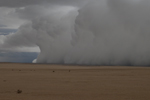Unprecedented flooding in Thailand, torrential rains pummeling El Salvador, long-term and beyond-extreme drought in Texas, killer snowstorm in the eastern US—and that’s just the last month or so. Extreme weather worldwide appears to be both increasing in frequency and intensity, and a new report from the Intergovernmental Panel on Climate Change (IPCC) connects the dots between wilder weather patterns and global climate change. Leaked to the Associated Press and the AFP, the draft report warns that the world should expect more floods, heatwaves, and droughts to such as extent that some region may become “increasingly marginal as places to live.”
Although the report still has to be vetted by scientists before its release later this month in Uganda, researchers are already calling this the largest effort to date to tease out the links between extreme weather and a warming world. Preliminary findings include the expectation of increasing precipitation (including snowfall) in high latitudes and the tropics; increasing and intensifying heatwaves; worsening droughts in some regions; and a continuing trend of breaking record high temperatures worldwide coupled with more frequent heatwaves.
Notably, the draft report finds that it is likely (above 66 percent) that global climate change has already worsened extreme weather worldwide.
This year the US has been rocked by several billion dollar extreme weather disasters, from tornadoes to flooding to hurricanes to heatwaves. Meanwhile, Texas is suffering its worst drought since the Dust Bowl; a drought in East Africa has propelled parts of the region into famine; and parts of China, too, are suffering from too-little rain. Thailand is currently experiencing its worst natural disaster in its history: unprecedented flooding has left hundreds dead and will cost an expected $6 billion. Across the globe, El Salvador has also suffered from flooding and landslides, killing over a hundred people.
Last year saw an historic killer heatwave in Russia, which a recent study found would very likely not have happened if not for climate change. India and Pakistan also suffered under vast deluges in 2010.
Related articles
Chart: US suffers record drought
(08/01/2011) An exceptional drought is still scorching major parts of Texas, New Mexico, Oklahoma, and Louisiana. A new report from the National Drought Mitigation Center finds that over July, nearly 12 percent of the US saw exceptional drought conditions, the highest record since monitoring began a dozen years. Exceptional drought is the worst possible on a 5-scale drought scale.
Adaptation, justice and morality in a warming world

(07/28/2011) If last year was the first in which climate change impacts became apparent worldwide—unprecedented drought and fires in Russia, megaflood in Pakistan, record drought in the Amazon, deadly floods in South America, plus record highs all over the place—this may be the year in which the American public sees climate change as no longer distant and abstract, but happening at home. With burning across the southwest, record drought in Texas, majors flooding in the Midwest, heatwaves everywhere, its becoming harder and harder to ignore the obvious. Climate change consultant and blogger, Brian Thomas, says these patterns are pushing ‘prominent scientists’ to state ‘more explicitly that the pattern we’re seeing today shows a definite climate change link,’ but that it may not yet change the public perception in the US.
NASA Photos: beyond Mississippi flood, southern Africa sees record deluges

(05/12/2011) While record crests of the Mississippi River are creating havoc in the southern US, this is not the only region in the world facing unprecedented flooding. Huge rain events have produced floods in southern Africa as well, impacting Namibia, Botswana, and South Africa. Since last year rainfall has been above average in much of these regions, including a record deluge this month in Namib Desert, where more rain fell in just one day in than usually does in an entire year.